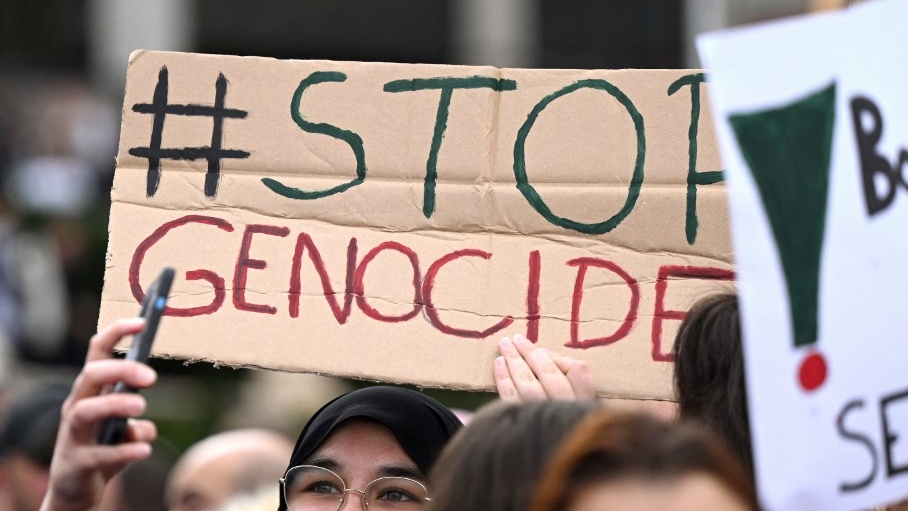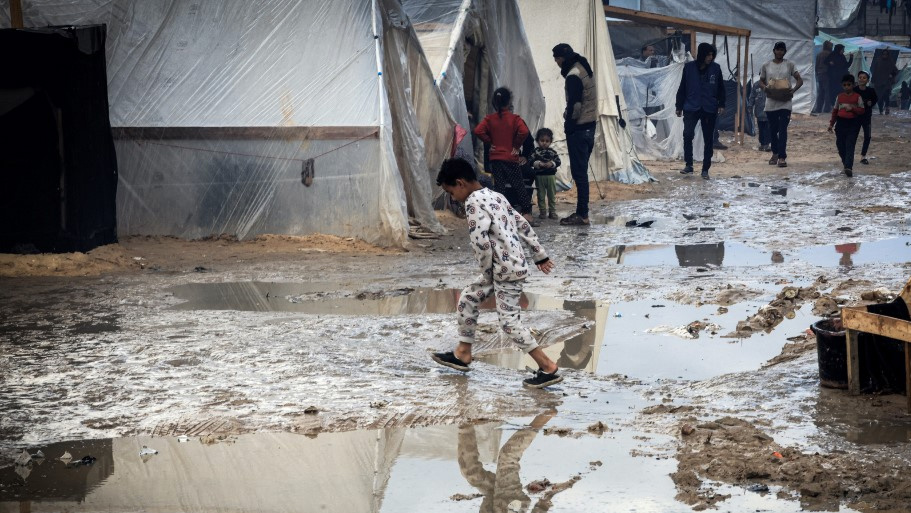War on Gaza: The fate of global justice hangs on South Africa's ICJ case

There is nothing rhetorical, tendentious or partisan about the application to the International Court of Justice (ICJ) in which South Africa accuses Israel of genocide in Gaza.
The 84-page document has been meticulously drafted by international experts in genocide. It is packed with supporting evidence. It is carefully legally argued. It makes an overwhelming case with cold, brutal, hard facts.
It acknowledges that Hamas was responsible for the atrocious war crimes against civilians in southern Israel on 7 October, but says nothing that took place that day can justify what has happened each day for the last three months against the population of Gaza as a whole.
The application sets out the unanswerable case that the intent, policy and actions of the state of Israel, as expressed by statements from the holders of the highest political office in the land and by the actions and behaviour of its soldiers, are genocidal and directed at Palestinians in Gaza as a group.
The document marshals the avalanche of evidence of premeditated acts of genocide into seven main categories. It is worth listing them:
New MEE newsletter: Jerusalem Dispatch
Sign up to get the latest insights and analysis on Israel-Palestine, alongside Turkey Unpacked and other MEE newsletters
1. The scale of the killing, which now exceeds 22,000 deaths, 70 percent of whom are women and children.
2. The cruel and inhuman treatment of large numbers of civilians, including children, who have been arrested, blindfolded, and forced to undress and remain outside in cold weather, before being taken to unknown locations.
3. The continual reneging on promises of safety, with Israel bombing areas it advised in leaflets residents to flee to.
4. The deprivation of access to food and water, a policy that has pushed the population of Gaza to the brink of famine.
Follow Middle East Eye's live coverage of the Israel-Palestine war
5. The deprivation of access to adequate shelter, clothes and hygiene; Israel’s attack on the healthcare system has left only 13 out of 36 hospitals still partially functioning, with Israeli forces targeting hospital generators, solar panels, oxygen stations, water tanks, ambulances, medical convoys and first responders.
6. The destruction of Palestinian life in Gaza - its towns, homes, apartment blocks, infrastructure, universities and culture.
7. Last but by no means least are the expressions of genocidal intent against the Palestinian people by state officials, including the references by Prime Minister Benjamin Netanyahu to the Biblical story of the total destruction of Amalek by the Israelites, the statement by President Isaac Herzog that “an entire nation out there is responsible”, and Defence Minister Yoav Gallant’s assertion that Israel was fighting “human animals”.
Real-time massacres
Giora Eiland, former head of the Israeli National Security Council and a government advisor, features especially large in putting into words what Israel is doing.
Describing Israel’s order to cut water and electricity to Gaza, Eiland wrote in an online journal: “This is what Israel has begun to do - we cut the supply of energy, water and diesel to the Strip … But it’s not enough. In order to make the siege effective, we have to prevent others from giving assistance to Gaza … The people should be told that they have two choices; to stay and to starve, or to leave. If Egypt and other countries prefer that these people will perish in Gaza, this is their choice.”
There are two features of the ICJ application that deserve attention.
The first is that unlike seeking redress for the most notorious events of recent history - such as the killing fields of Cambodia, the Rwandan genocide, or Serbian war crimes - the application concerns a genocide that is happening in real time.
The plain truth is that no country is doing more to delegitimise Israel than the Israeli state itself
It is happening every day and will continue to take place if no outside power or court intervenes. The urgency of this application to the ICJ is compelling.
But almost as important is the country making this application. Both South Africa and Israel are bound by the statutes of the ICJ, and both are parties to the Genocide Convention.
More importantly, no country has done more than South Africa to prove that a liberation struggle against a despotic and overwhelmingly powerful apartheid regime can succeed.
Like Israel today, apartheid South Africa was a nuclear power, with a strong army that crushed armed rebellion - and it, too, was supported by all the major western powers.
Apartheid South Africa killed itself through its own actions. A pariah state, it had in the end to surrender to the will of the suppressed Black majority.
Shrinking audience
Aware of the significance of this application, Israel has responded by absurdly accusing South Africa of complicity with Hamas, a group that is proscribed as a terrorist organisation in the UK and other countries - a claim for which there is no evidence.
Government mouthpiece Eylon Levy accused South Africa of being “criminally complicit” with Hamas’s “campaign of genocide” against the Israeli people.
“The state of Israel will appear before the International Court of Justice at the Hague to dispel South Africa’s absurd blood libel,” he said. “How tragic that the Rainbow Nation that prides itself on fighting racism will be fighting pro bono for anti-Jewish racists.”
Levy appears to have forgotten what he wrote in August against Israel’s own resident fascist, National Security Minister Itamar Ben Gvir, when he urged the prime minister to sack him.
“Why, why is the Israeli Prime Minister’s Office going out of its way to do Hasbara for convicted terror supporter Ben Gvir instead of sacking him? I wish I were Netanyahu’s foreign media spokesman, just so I could resign in protest,” Levy wrote.
Now Levy is a government spokesperson, doing Ben Gvir’s work for him. But Levy’s audience is a shrinking one, and listening to him is becoming a minority sport.
This did not stop Israel’s principal backers from dismissing South Africa’s case, before it has even been heard at the Hague. White House National Security Council spokesperson John Kirby described South Africa’s case as “meritless, counterproductive, and completely without any basis in fact whatsoever”. And former UK Prime Minister Boris Johnson separately condemned a Metropolitan Police investigation into Israel’s war crimes, complaining about the “worrying politicisation” of the police force.
Still, Israel is failing to get its message across, as other nations - such as Malaysia, Turkey and many others - line up behind South Africa. Most countries in the United Nations General Assembly have told Israel to stop its campaign in Gaza immediately.
The plain truth is that no country is doing more to delegitimise Israel than the Israeli state itself.
'Voluntary' resettlement
You don’t need a law degree to decipher what is going on. To get a sense of Israel’s daily output of hate speech, all you have to do is watch and listen to the videos of soldiers, singers, artists, and politicians. They are no longer a fringe. They represent what mainstream Israel thinks.
They have become genocidal, racist and fascist when talking about Palestinians - unashamedly so. They are proud of and joke about their racism, and do little to disguise it.
Was this racism a recent creation, or was it lurking in the dark corners of discourse behind the - plainly false - trappings of an open liberal western democracy?
This is not a question that veteran Israeli journalist Gideon Levy can honestly answer.
Levy told journalist Owen Jones, in reference to a poll showing that most Israelis supported the ethnic cleansing of Gaza, that Israel is now a country he no longer recognises.
“It’s one of two [options]: Either that’s the real face of Israel and the attack on the 7th legitimised it to be above the surface, or that the 7th really changed things,” Levy said. “I don’t know which one is true, but I keep on thinking, if one attack - as barbaric as it was, and it was barbaric - if one attack pushes so many Israelis to become inhuman … imagine yourself what it does to Palestinians who live under those attacks for decades.”
As Levy acknowledges, most Israelis are blind to what their state is doing in Gaza. They make no secret of their intent to destroy as much of Gaza as possible.
Behind the scenes, senior officials are reportedly in secret talks with Congo for the “voluntary” resettlement of Palestinians from Gaza. Saudi Arabia, Iraq and other states had been approached with the same policy in mind, long before the Hamas attack.
These carefully arranged contacts cannot be conceived as a reaction to trauma, nor are they merely the brainchild of the likes of Ben Gvir or Finance Minister Bezalel Smotrich. Emptying Palestine of its people is a deeply embedded, long-term strategy.
If it is not stopped, Israel will continue on the same path, irrespective of what happens to Hamas.
The way forward
But even on this narrow point, history lends no support to a policy of targeting resistance leaders with assassination.
The killing of Hamas deputy leader Saleh al-Arouri in Beirut is being compared to Mossad’s hunting down of the planners of the massacre that took place at the Munich Olympics in 1972.
But the targeted assassination of Palestinian leaders is nothing new, nor patently does it succeed. The relief it provides Israel is strictly temporary.
These are words that any western leader allowing Israel to carry on with mass murder can ill afford to ignore
Nearly two decades ago, Israel targeted Ahmed Yassin, a quadriplegic in a wheelchair, with missiles fired from a helicopter, as he was being wheeled to a mosque for morning prayers.
Just two years after his death, Hamas won the first free elections to be held in Palestine for many years. Both politically and militarily, Hamas today is incomparably bigger, more potent and more popular than the organisation that Yassin founded.
Twenty years ago, Hamas could never have withstood three months of continuous bombardment and still be able to fire missiles reaching Tel Aviv. Its fighters could never have inflicted the casualties the Israeli army is currently suffering.
The assassination of Hamas leaders will only encourage a new generation of resistance leaders to step forward, each generation being more powerful than the last. To think otherwise is dreamland. And Israel is also targeting the people with whom it must one day negotiate.
The former UK Middle East minister and native South African, Peter Hain, has said that peace talks including Hamas are the only way forward for Israel and its allies.
“I write this from Cape Town where decent South Africans of all races and creeds are contemptuous of what they see as profound double standards by global north leaders - wanting backing for Ukrainian self-determination, but being complicit in the denial of Palestinian self-determination and culpable in the horror in Gaza,” he wrote in the Guardian. “The geopolitical breach with the global south is deepening, and will cost Washington, London and Brussels dearly in an increasingly turbulent world.”
These are words that any western leader allowing Israel to carry on with mass murder can ill afford to ignore.
The ICJ has agreed to hold a hearing next week to discuss South Africa’s request for an urgent ruling. No hearing at the World Court at the Hague is more pressing. The fate of that endangered species called international justice depends on it.
The views expressed in this article belong to the author and do not necessarily reflect the editorial policy of Middle East Eye.
This article is available in French on Middle East Eye French edition.
Middle East Eye delivers independent and unrivalled coverage and analysis of the Middle East, North Africa and beyond. To learn more about republishing this content and the associated fees, please fill out this form. More about MEE can be found here.








